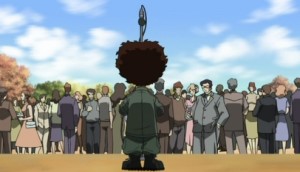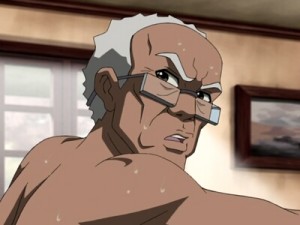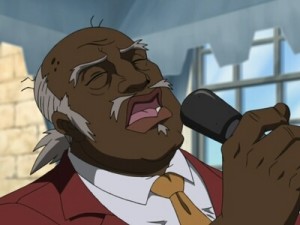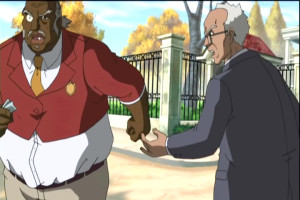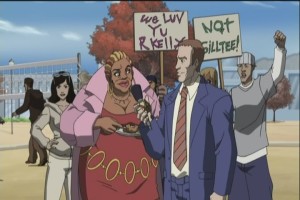After three and a half years of waiting, fans of Aaron McGruder’s hit comic strip turned animated television series “The Boondocks” is about to premiere a fourth season of controversial, yet insightful look about African-American culture, pop culture and societal woes seen through the eyes of two young “urban youths”, their elderly guardian and a cast of unforgettable characters. What better time to look back at the past seasons and the lessons that came from a show like “The Boondocks” than now?
Don’t tell people the truth – Huey (Season 1-Episode 1 “The Garden Party”)
The series’ opening scene was a rather dubious one. An unidentified Huey Freeman narrated over the zooming sight of what is now his hometown about having prophetic dreams. From there, the images shifted from the lush landscape to the eldest Freeman brother walking onto a stage to announce, “Jesus was black, Ronald Reagan was the devil, and the government is lying about 9/11.”
In front of the boisterous Huey was a group of rich, aristocratic Caucasians (though there was one African-American basketball player thrown in there) stunned over this child’s boldness and hope to reveal the “truth”. And with unexpected truth came chaos. The war that began thanks to Huey’s actions ended just as quickly as it started thanks to his grandfather slapping him awake.
You see, Grandpa Freeman didn’t just slap his grandson awake. Huey’s grandfather condemned the truth-seeker/speaker of a grandson for telling people the grim reality. People don’t want to hear the truth. They want to be lied to, made feel better, and not have their garden party ruined by someone’s big mouth.
“Why buy the tape when you can get the infomercial for free?” – Granddad (Season 1-Episode 1 “The Garden Party”)
Following the opening credits, we were given an incredible/disturbing view of an old man working out without a single thread of clothes covering his giggling frame. For DVD watchers, this moment is presented in its uncensored glory. If you could look past the sight of a grunting Grandpa Freeman’s genitals flopping around, you’d hear a great piece of wisdom.
Most exercise infomercials last around twenty-plus minutes (like the Billy Blanks’ “Tae Bo” ads Granddad used on a daily basis). So instead of giving in and buying the entire tape/DVD set, why not record the show and use it as your exercise routine? Saves you money and gets you in shape. Sounds like a win-win to me.
A “Code Black” means there are some hungry-looking black people at the front gate (Don’t trust them new n****s over there) (Season 1-Episode 1 “The Garden Party”)
After meeting Ed Wuncler Sr. (“I own the bank that owns your house.” – Ed Wuncler Sr.), Robert “Granddad” Freeman has the opportunity attend a garden party at the Wuncler estate (remember Huey’s prophetic dream). Arriving at the Wuncler residence, Robert and his family are pushed aside by a cock-eyed, rather homely African-American who believed the well-dressed family was a Wuncler employee like himself.
Upon realizing his assumptions were wrong, this frightened man – Uncle Ruckus – radioed the security crew to tell them about a “Code Black” situation occurring in front of him (“There’s some hungry lookin’ n****s at the front gate” – Uncle Ruckus).
Security quickly reprimanded Uncle Ruckus, escorting Mr. Wuncler’s guests onto the grounds. Later in the episode, a drunk and belligerent Ruckus got on stage (the same stage Huey used to unsuccessfully inform his fellow attendees about Jesus, Reagan, and 9/11) to tell the crowd to not, “…trust dem new n****s over there.”
While Ruckus’ song fell on deaf ears, the feeling of self-hate in the African-American community couldn’t be denied due to Ruckus’ actions. Thanks to jealously over material possessions; believed favoritism by Caucasians and even different skin tones, societal angst between black people isn’t uncommon. With people like Ruckus in the world, these problems in the African-American community will never go away. Learn from Ruckus and don’t be an ignorant fool who’s the butt of everyone’s jokes; including their own.
“What happened to standards?” – Huey Freeman (Season 1-Episode 2 “The Trial of Robert Kelly”)
In the early 2000s, R & B singer R. Kelly seemingly had a problem with urinating on underage girls. While he was never found guilty, many continued to believe that R. Kelly loved to give golden showers. Others, mostly fans of Kelly’s musical talents, opted to blindly support the man trapped in the closet. In the series’ second episode, R. Kelly found himself fighting the law for his inability to keep his urine to himself.
As Riley tried to understand how someone could go to jail for peeing on a person, Huey nonchalantly warned neighbor and prosecutor for Kelly’s latest case Thomas Dubois that, “…n****s love R. Kelly.”
In Huey’s mind, the ignorant R. Kelly fans would overpower the jury’s sense of justice. By the time the trial began, Huey’s warning was coming into fruition. The once respectable courtroom turned into a dance floor for a free R. Kelly concert. Spectator Huey Freeman had seen enough. Standing in front of the raucous “party-goers”, Huey openly questioned what happened to the bare minimum of common sense. Instead of pretending R. Kelly was a hero, support the rehabilitation of R. Kelly and people like him. Sadly for Huey and the justice system, ignorance overcame common sense.
Just because your favorite singer, actor, athlete is great at what he or she does doesn’t make those individuals absolved from acting a fool. Don’t lie to yourself and not question whether this person you admire is capable of such atrocities as peeing on a teenager; or worst.


